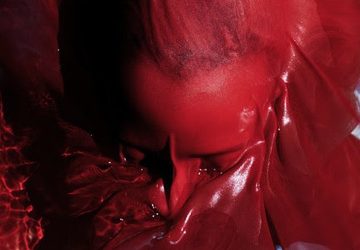
As with many musicians who depend on touring for their livelihood, Welch faced an uncertain future when the pandemic spurned worldwide lockdowns. Whether in-person concerts would return was suddenly an unknown, and many were left to wonder if the day that live music died would occur within their own lifetimes. For this particular British artist, anxiety had to be channeled through art, just as it had been for the past 15 years on albums such as 2009’s Lungs, 2011’s Ceremonials, and 2018’s High as Hope.
Her latest, Dance Fever, is a collection that was born of these times, though its material is rarely a direct result of our current issues. Yes, there is an indelible influence lurking deep in the layers of Welch’s latest, but this never dominates. Instead, her passionate poetry turns to elements of social psychology and folklore, as well as universal themes of vulnerability.
In short, Welch does as she has always done and melds the mythical and mystical into modern fairytales. Take, for example, the bespelling “Cassandra.” Drawing on Greek mythology, she explores the curse of prescience alongside her own lyrical prophecies; in the process, creating a timeless earworm. But nowhere is her ability to use the fantastical as inspiration more prominent than in “Choreomania.” Undulating like a silken veil in a soft breeze, then shifting and violently transforming its shape, the song was inspired by a historical “dancing plague” that hit Europe in the early 16th century, a social phenomenon that caused victims to literally dance themselves to their deaths.
The hysteria behind “Choreomania,” which lends the record its title, has its claws in various other offerings throughout Dance Fever, particularly “Free.” An ode to embracing what you love to fight back against the cycle of anxiety, the infectious song—whose lovely video is dedicated to the relentless spirit of the Ukrainian people, a global force for freedom—is as close as one can get to bottling the sensation of sheer, unfiltered joy and the rhythmic wiggle that overtakes our bodies when no one is watching.
Obviously, there are also personal songs, moments that allow us that one-on-one time with the songbird. Here, Welch explores living inside her own mind (“Back in Town”), anxiety over the future (“My Love”), sobering grace (“Morning Elvis”), and her relationship with touring (“The Bomb”). As with many of Dance Fever’s tracks, these sentiments are echoed elsewhere, as well. “The Bomb,” for example, pairs well with “King,” the album’s opener and perhaps its most deeply personal confession. A powerful reflection on the decision that many women face today, in choosing a career or children, Welch’s vocals lend a delicate might that is beautifully complemented by the gorgeous blend of musical textures that belie the song’s seeming simplicity. (Additionally, “King,” much like “Cassandra,” is home to some exquisite harp work from Tom Moth.)
Yet as feather soft as Welch’s vocals may be, her sentiments are often full of frustrated rage packed inside a melodic punch. This is most obvious in “Dream Girl Evil,” whose anthemic liberation sculpts the song that would best fit on High as Hope. Offering a satirical spit in the face of a society that villainizes women for being perfectly imperfect humans, Welch uses her words as armor. In “Girls Against God,” however, there is less condemnation; instead, she embarks on a search for the spiritual experience.
The cinematic scenes and bold concepts on Dance Fever are endless. From the Jackson Pollock-esque wild brushstrokes and fervid splashes of “Heaven Is Here,” to the urge to find beauty in the little things on “Daffodil,” the album presents listeners with moment after moment of beautifully cultivated gems. With dashes of smoky soul and steadying percussion, acoustics alongside anthemic clamors, disco-dusted dance-a-thons, and even pedal steel guitar, there is no shortage of roaring joy inspired by the uplifting creative spirit.
And so, Dance Fever is, above all things, a window into the soul of its creator who is willing to delight in a simple yellow sprig, experience sobering grace in front of a crowd, and launch an artistic rebellion against a societal machine that wishes to control. With vulnerability, honesty, and authenticity, whether dancing, singing, or simply penning words on paper, Florence Welch reminds us that she is, always and forever, a woman—hear her roar! For this, Cryptic Rock gives Dance Fever 5 out of 5 stars.







No comment